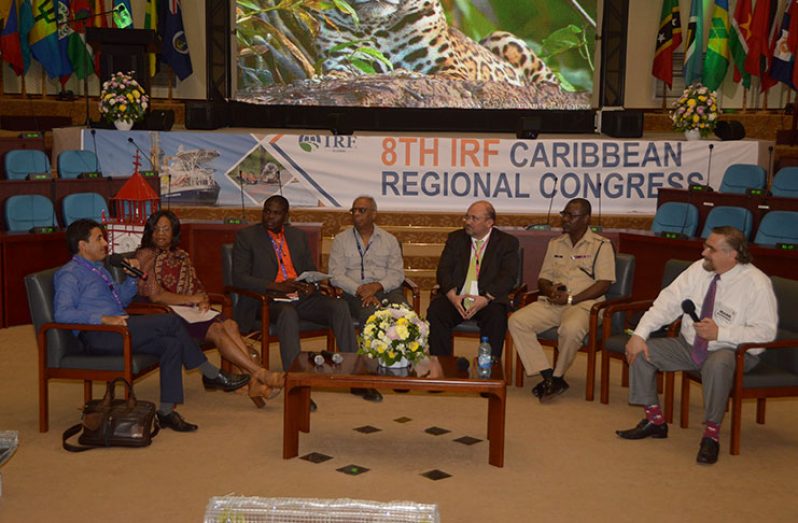…traffic safety coordinator urges
PROJECT Coordinator of the Ministry of Public Infrastructure’s Traffic and Safety Maintenance Department, Kester Hinds, has called for higher fines to be charged to road users who disregard the proper usage of roadways.
According to statistics published by the Pan American Health Organisation and the World Health Organisation (PAHO/WHO), deaths from traffic crashes are among one of the top 10 causes of fatalities in Guyana. At breakout session of the Eighth International Road Federation (IRF) Caribbean Regional Congress in Guyana, Hinds put forward that education and enforcement, complimented with higher fines, must be viewed as a possible deterrent to improper road usage.
He made the remarks on Wednesday at the Arthur Chung Conference Centre (ACCC), on the first day of the three-day congress, where infrastructure and engineering experts from the Region assembled. “Often times you find that persons would continuously violate traffic laws and regulations because the penalties are not severe. Education [alone] sometimes doesn’t work, it needs to be complemented with stiff penalties via enforcement,” Hinds said, adding:
“If you’re going to educate persons on how they should use the roads, whenever they break those laws they should be sanctioned with stiff penalties that will give the deterrent in the future for others who might have the intention of breaking those laws.”
Hinds was among a panel of several other experts, which included Guyana Police Force (GPF) Traffic Chief, Linden Isles, who discussed ‘Diagnosing Road Safety Risk’ in the Region
They all spoke to a number of road improvements they believe are necessary in their country and the Region at large, to deal with transportation challenges.
The project coordinator also presented the need for improved speed-calming measures in Guyana to guard against speeding.
“We are very good at installing speed humps and many persons are in support of it and, of course, some are not in support of speed humps. That’s a measure that can work when you’re dealing with city streets but if we’re building a large highway we must put some necessary speed-calming measures in place,” he said.
Coupled with this is the need for old vehicles to be replaced by new ones in which Hinds said come with enhanced safety features which are geared towards protecting all categories of road users.
On another point, he told the audience of the need for greater emphasis to be placed on separating and protecting pedestrians and vehicle users while in transit.
He recommended raised sidewalks separated from the road with guard rails in order to prevent pedestrians from being injured during a road accident.
Hinds also recommended overpasses much like the ones the government has begun to construct on busy roadways in Georgetown, but he was not too keen on the idea of underpasses.
“For a country like Guyana, which is below sea level and there is the existence of a high water table, underpasses may be challenge. Of course, money is not an object but we must take into consideration heavy rainfall and [the fact] that it may become flooded,” he said.
In his contribution on the panel, Traffic Chief Linden Isles informed those attending that most of the motor vehicle accidents in Guyana are caused by speeding.
One way in which he recommended that the trend could be addressed is through enforced lane-driving in accordance to specific speed limits.
“We must look at separating the different speed limits through lane driving,” Isles stated.
“Most times, what you find is that persons in the outer lane are driving slow; not to the speed limit but below the speed limit and the person driving behind would try to overtake that person. But, if there is a speed for the specific lane it means that that driver will have to observe the speed limit of the lane.”
Making another contribution on how Guyana can address the issues, the traffic chief expressed the need for More Closed Circuit Television (CCTV) Cameras to be strategically placed on roadways.
“With a lack of these cameras you would find that persons commit offences but if at each and every intersection there’s a camera being monitored by the police, I think we’ll have better road users,” he reasoned.
But even as these needs are being pushed for by the GPF, the traffic chief also stressed the need for road users to be regularly educated about the responsibilities regarding road use.
He stated: “What you find is that we have educational programmes but it is not getting to the targeted people but if we have money to spend on those programmes we’ll design it so that it can reach the targeted group.”




.jpg)










